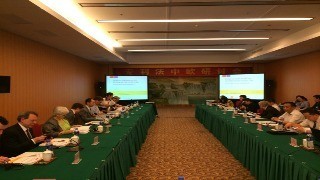
Follow up Peer to Peer Exchange on the Reform of the PRC Patent Law
Last July 2014, a ministry-led delegation of the Legislative Affair Commission at the Standing Committee of the National People’s Congress (LAC) travelled to the EU (Ireland and Denmark) to engage in a series of workshops and expert meetings organised by IP Key. The aim was to consult and exchange with European experts from PTOs, University, Government and law profession on various patent law reform policy issues.
A follow-up workshop/seminar took place in China (Zhaoqing, Guangdong) on May 12 and 13, 2015, in order to continue these productive discussions. In this context, IP Key invited six EU Experts (among academics, judges, seasoned government and law professionals), to join the seminar.
The LAC delegation from Beijing was composed by Director General Mr Wang Chaoying and by members of the highly specialised team which will work on the final revision of the Patent Law, before the law will be enacted by the Standing Committee of the National People’s Congress. Senior officers of the State Intellectual Property Office (SIPO), of the State Council Legislative Affairs Office (SCLAO) and judges of Guangzhou IP Court also joined the discussions.
Director Zhang Shui Xiang of Zhaoqing People’s Congress opened the seminar by addressing welcome remarks and Mr Davide Follador of IP Key then introduced the EU speakers and moderated the discussions.
Presentations of EU experts Mr Lawrence Cullen, Mr Stefan Luginbuehl, Ms Beate Schmidt, Mr Massimo Scuffi, Mr Cesare Galli and Mr Tom Duke were followed by extensive and interactive discussions on topics of actual relevance in the workings of reform, addressing both validity and enforcement of patents, among these:
・ Patent examination standards and requirements for documentations filed in languages other than Chinese;
・ Office practices in acceptance of post-filed supplemental experimental data in chemical and pharmaceutical inventions;
・ Measures to implement “patent quality” procedures;
・ Approaches to assessment of inventive step and novelty;
・ Patent enforcement: implementing and efficient system for Court interim reliefs;
・ Criteria for calculation of award of damages for patent infringement;
・ Measures to tackle online infringement and profiles for liabilities of intermediaries;
・ Invalidation of patents: “bifurcation” and single approach system, best practices and case studies;
・ National practices and case law on supplementary protection certificates.
Chinese and European experts also discussed the issue of “patent trolls” as well as the benefits of incentives to patenting and alternative dispute resolution methods through mediation.
The agenda of the event is available here and presentations can be downloaded from the IP Key IP Document Centre.
IP Key is grateful to LAC and to the Zhaoqing People’s Congress for the excellent logistic support and welcomes once again this great opportunity for exchanges with the LAC.
Zhaoqing seminar was followed by the second IP Café at Sun Yat-sen University in Guangzhou (more information available here), where EU judges and academics engaged in roundtable discussions with their Chinese peers on the challenges ahead for the newly established IP Courts, with a look at the reform of the Unitary Patent Court in the EU.
For more information on this activity contact Davide Follador davide.follador@ipkey.org.
For general information on IP Key please contact Jaspal Channa jaspal.channa@ipkey.org
